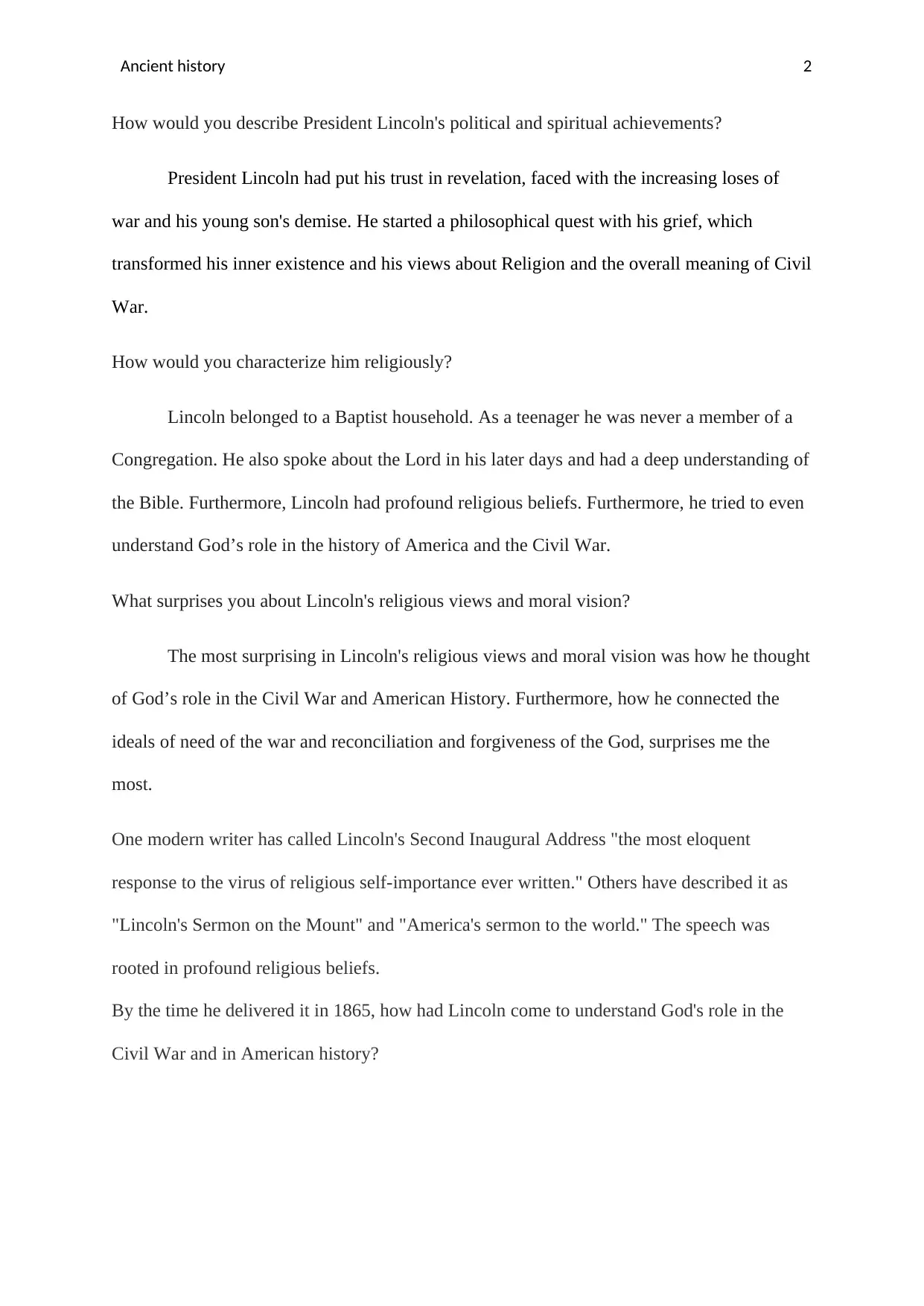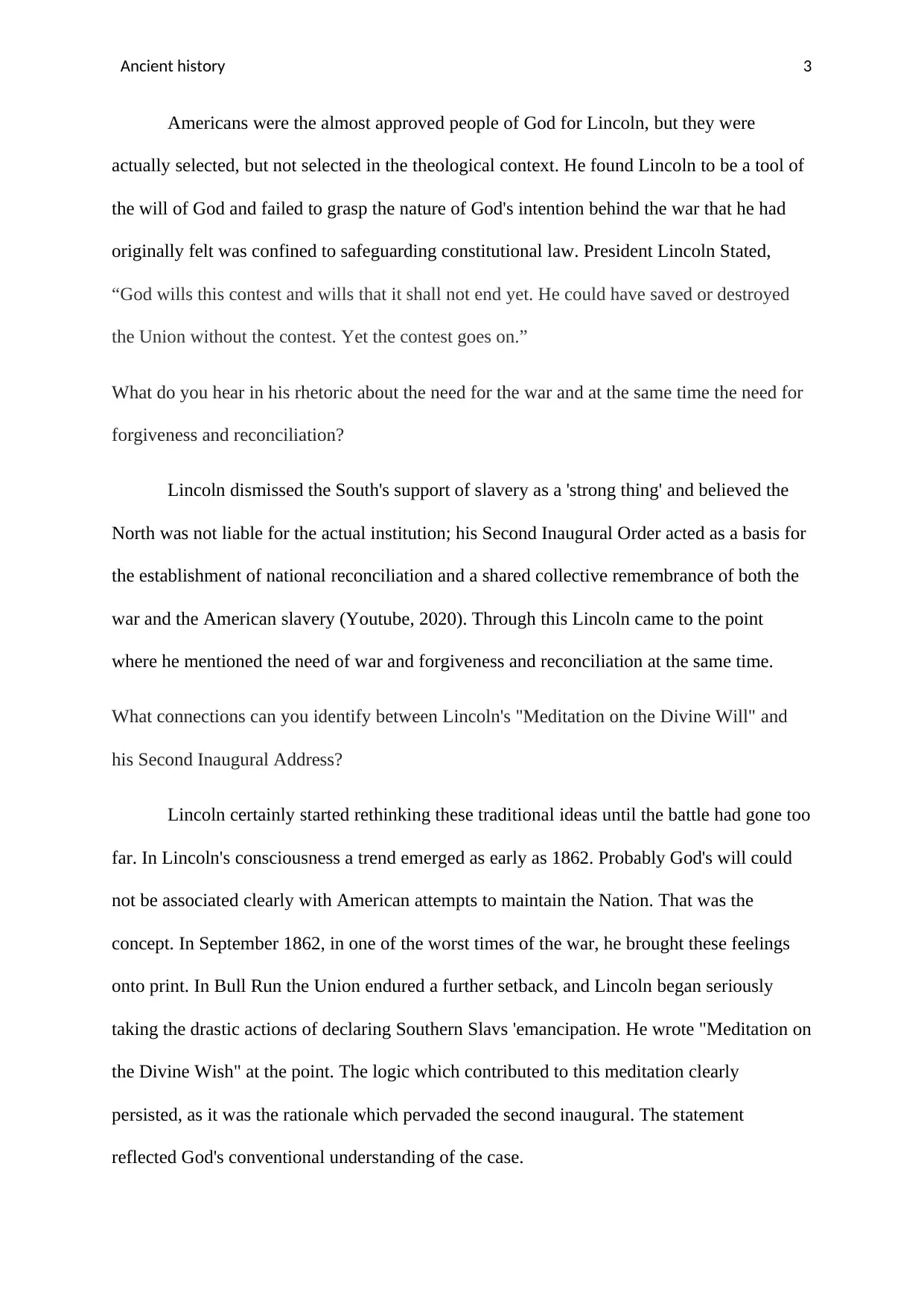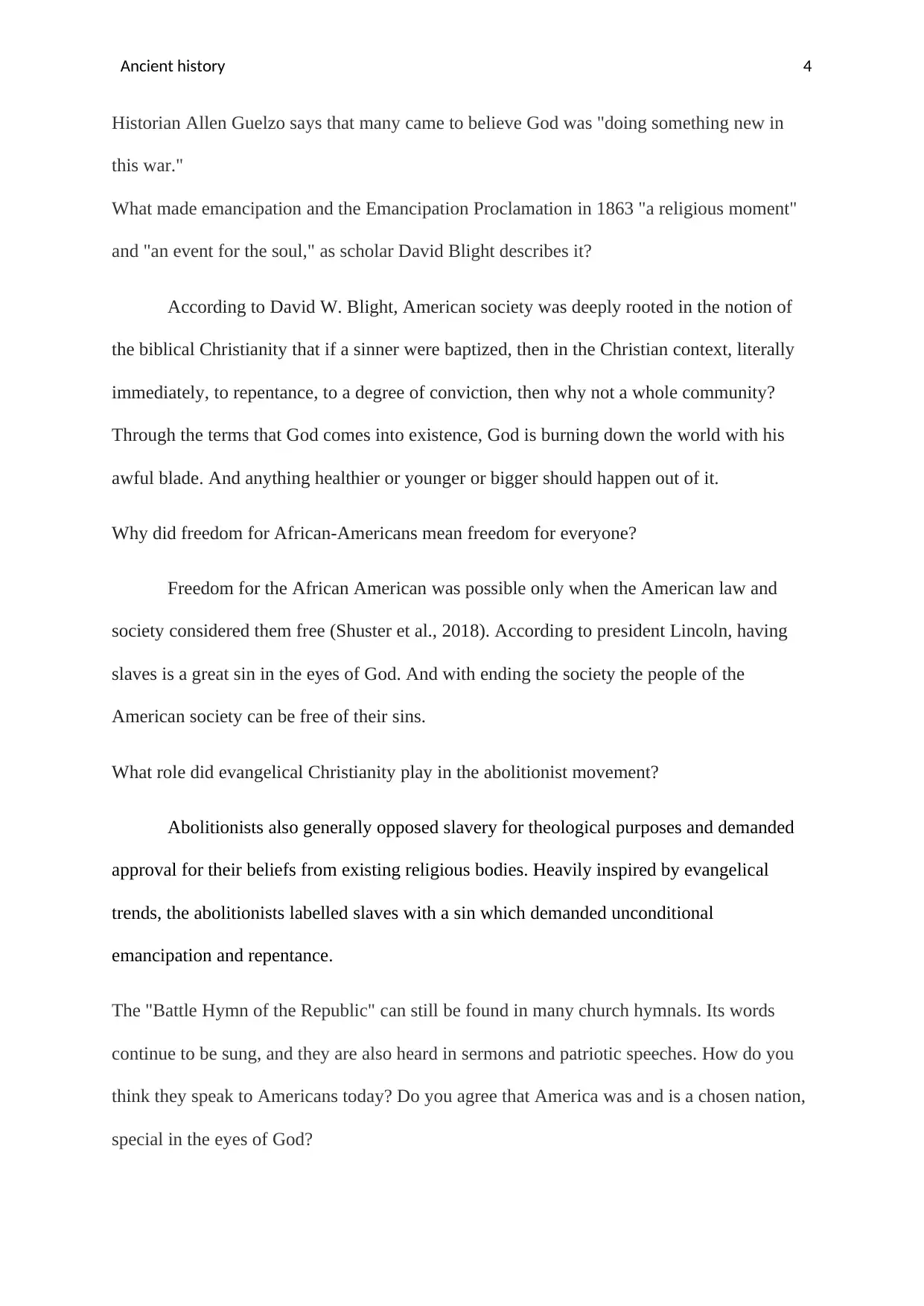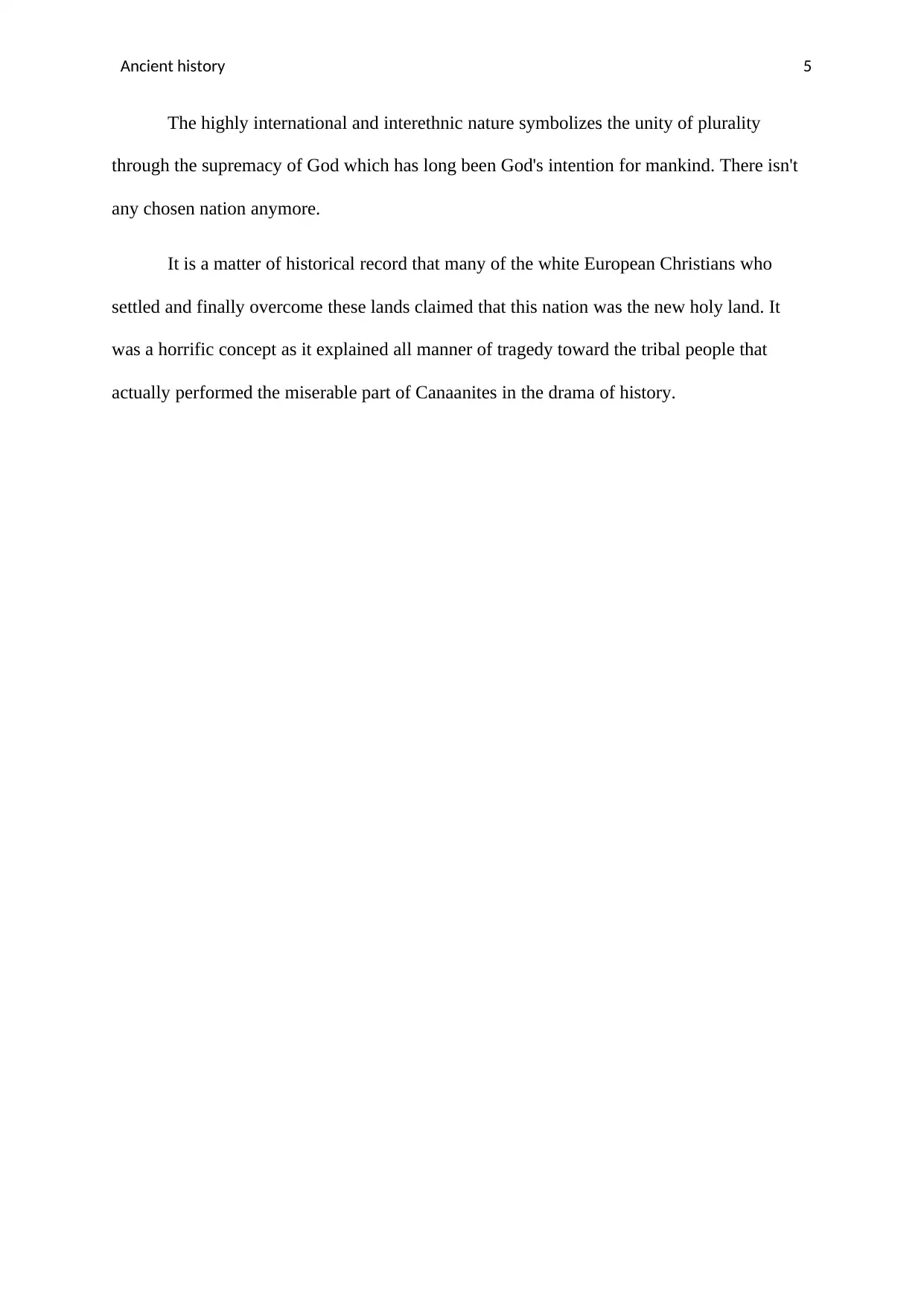Ancient History 1: President Lincoln's Religious and Moral Vision
VerifiedAdded on 2022/09/15
|6
|1129
|32
Essay
AI Summary
This essay delves into President Lincoln's political and spiritual achievements, exploring his religious views and moral vision. It examines his understanding of God's role in the Civil War and American history, analyzing his Second Inaugural Address and the connections between his "Meditation on the Divine Will." The essay also investigates the significance of emancipation and the Emancipation Proclamation as religious moments, the role of evangelical Christianity in the abolitionist movement, and the impact of the "Battle Hymn of the Republic." Furthermore, it addresses the concept of America as a chosen nation and the implications of freedom for African-Americans. The assignment utilizes references from PBS.org and scholarly works to support its analysis.

Ancient history 1
Title
Student’s Name
Institute
Course Code and Name
Professor
Date
Title
Student’s Name
Institute
Course Code and Name
Professor
Date
Paraphrase This Document
Need a fresh take? Get an instant paraphrase of this document with our AI Paraphraser

Ancient history 2
How would you describe President Lincoln's political and spiritual achievements?
President Lincoln had put his trust in revelation, faced with the increasing loses of
war and his young son's demise. He started a philosophical quest with his grief, which
transformed his inner existence and his views about Religion and the overall meaning of Civil
War.
How would you characterize him religiously?
Lincoln belonged to a Baptist household. As a teenager he was never a member of a
Congregation. He also spoke about the Lord in his later days and had a deep understanding of
the Bible. Furthermore, Lincoln had profound religious beliefs. Furthermore, he tried to even
understand God’s role in the history of America and the Civil War.
What surprises you about Lincoln's religious views and moral vision?
The most surprising in Lincoln's religious views and moral vision was how he thought
of God’s role in the Civil War and American History. Furthermore, how he connected the
ideals of need of the war and reconciliation and forgiveness of the God, surprises me the
most.
One modern writer has called Lincoln's Second Inaugural Address "the most eloquent
response to the virus of religious self-importance ever written." Others have described it as
"Lincoln's Sermon on the Mount" and "America's sermon to the world." The speech was
rooted in profound religious beliefs.
By the time he delivered it in 1865, how had Lincoln come to understand God's role in the
Civil War and in American history?
How would you describe President Lincoln's political and spiritual achievements?
President Lincoln had put his trust in revelation, faced with the increasing loses of
war and his young son's demise. He started a philosophical quest with his grief, which
transformed his inner existence and his views about Religion and the overall meaning of Civil
War.
How would you characterize him religiously?
Lincoln belonged to a Baptist household. As a teenager he was never a member of a
Congregation. He also spoke about the Lord in his later days and had a deep understanding of
the Bible. Furthermore, Lincoln had profound religious beliefs. Furthermore, he tried to even
understand God’s role in the history of America and the Civil War.
What surprises you about Lincoln's religious views and moral vision?
The most surprising in Lincoln's religious views and moral vision was how he thought
of God’s role in the Civil War and American History. Furthermore, how he connected the
ideals of need of the war and reconciliation and forgiveness of the God, surprises me the
most.
One modern writer has called Lincoln's Second Inaugural Address "the most eloquent
response to the virus of religious self-importance ever written." Others have described it as
"Lincoln's Sermon on the Mount" and "America's sermon to the world." The speech was
rooted in profound religious beliefs.
By the time he delivered it in 1865, how had Lincoln come to understand God's role in the
Civil War and in American history?

Ancient history 3
Americans were the almost approved people of God for Lincoln, but they were
actually selected, but not selected in the theological context. He found Lincoln to be a tool of
the will of God and failed to grasp the nature of God's intention behind the war that he had
originally felt was confined to safeguarding constitutional law. President Lincoln Stated,
“God wills this contest and wills that it shall not end yet. He could have saved or destroyed
the Union without the contest. Yet the contest goes on.”
What do you hear in his rhetoric about the need for the war and at the same time the need for
forgiveness and reconciliation?
Lincoln dismissed the South's support of slavery as a 'strong thing' and believed the
North was not liable for the actual institution; his Second Inaugural Order acted as a basis for
the establishment of national reconciliation and a shared collective remembrance of both the
war and the American slavery (Youtube, 2020). Through this Lincoln came to the point
where he mentioned the need of war and forgiveness and reconciliation at the same time.
What connections can you identify between Lincoln's "Meditation on the Divine Will" and
his Second Inaugural Address?
Lincoln certainly started rethinking these traditional ideas until the battle had gone too
far. In Lincoln's consciousness a trend emerged as early as 1862. Probably God's will could
not be associated clearly with American attempts to maintain the Nation. That was the
concept. In September 1862, in one of the worst times of the war, he brought these feelings
onto print. In Bull Run the Union endured a further setback, and Lincoln began seriously
taking the drastic actions of declaring Southern Slavs 'emancipation. He wrote "Meditation on
the Divine Wish" at the point. The logic which contributed to this meditation clearly
persisted, as it was the rationale which pervaded the second inaugural. The statement
reflected God's conventional understanding of the case.
Americans were the almost approved people of God for Lincoln, but they were
actually selected, but not selected in the theological context. He found Lincoln to be a tool of
the will of God and failed to grasp the nature of God's intention behind the war that he had
originally felt was confined to safeguarding constitutional law. President Lincoln Stated,
“God wills this contest and wills that it shall not end yet. He could have saved or destroyed
the Union without the contest. Yet the contest goes on.”
What do you hear in his rhetoric about the need for the war and at the same time the need for
forgiveness and reconciliation?
Lincoln dismissed the South's support of slavery as a 'strong thing' and believed the
North was not liable for the actual institution; his Second Inaugural Order acted as a basis for
the establishment of national reconciliation and a shared collective remembrance of both the
war and the American slavery (Youtube, 2020). Through this Lincoln came to the point
where he mentioned the need of war and forgiveness and reconciliation at the same time.
What connections can you identify between Lincoln's "Meditation on the Divine Will" and
his Second Inaugural Address?
Lincoln certainly started rethinking these traditional ideas until the battle had gone too
far. In Lincoln's consciousness a trend emerged as early as 1862. Probably God's will could
not be associated clearly with American attempts to maintain the Nation. That was the
concept. In September 1862, in one of the worst times of the war, he brought these feelings
onto print. In Bull Run the Union endured a further setback, and Lincoln began seriously
taking the drastic actions of declaring Southern Slavs 'emancipation. He wrote "Meditation on
the Divine Wish" at the point. The logic which contributed to this meditation clearly
persisted, as it was the rationale which pervaded the second inaugural. The statement
reflected God's conventional understanding of the case.
⊘ This is a preview!⊘
Do you want full access?
Subscribe today to unlock all pages.

Trusted by 1+ million students worldwide

Ancient history 4
Historian Allen Guelzo says that many came to believe God was "doing something new in
this war."
What made emancipation and the Emancipation Proclamation in 1863 "a religious moment"
and "an event for the soul," as scholar David Blight describes it?
According to David W. Blight, American society was deeply rooted in the notion of
the biblical Christianity that if a sinner were baptized, then in the Christian context, literally
immediately, to repentance, to a degree of conviction, then why not a whole community?
Through the terms that God comes into existence, God is burning down the world with his
awful blade. And anything healthier or younger or bigger should happen out of it.
Why did freedom for African-Americans mean freedom for everyone?
Freedom for the African American was possible only when the American law and
society considered them free (Shuster et al., 2018). According to president Lincoln, having
slaves is a great sin in the eyes of God. And with ending the society the people of the
American society can be free of their sins.
What role did evangelical Christianity play in the abolitionist movement?
Abolitionists also generally opposed slavery for theological purposes and demanded
approval for their beliefs from existing religious bodies. Heavily inspired by evangelical
trends, the abolitionists labelled slaves with a sin which demanded unconditional
emancipation and repentance.
The "Battle Hymn of the Republic" can still be found in many church hymnals. Its words
continue to be sung, and they are also heard in sermons and patriotic speeches. How do you
think they speak to Americans today? Do you agree that America was and is a chosen nation,
special in the eyes of God?
Historian Allen Guelzo says that many came to believe God was "doing something new in
this war."
What made emancipation and the Emancipation Proclamation in 1863 "a religious moment"
and "an event for the soul," as scholar David Blight describes it?
According to David W. Blight, American society was deeply rooted in the notion of
the biblical Christianity that if a sinner were baptized, then in the Christian context, literally
immediately, to repentance, to a degree of conviction, then why not a whole community?
Through the terms that God comes into existence, God is burning down the world with his
awful blade. And anything healthier or younger or bigger should happen out of it.
Why did freedom for African-Americans mean freedom for everyone?
Freedom for the African American was possible only when the American law and
society considered them free (Shuster et al., 2018). According to president Lincoln, having
slaves is a great sin in the eyes of God. And with ending the society the people of the
American society can be free of their sins.
What role did evangelical Christianity play in the abolitionist movement?
Abolitionists also generally opposed slavery for theological purposes and demanded
approval for their beliefs from existing religious bodies. Heavily inspired by evangelical
trends, the abolitionists labelled slaves with a sin which demanded unconditional
emancipation and repentance.
The "Battle Hymn of the Republic" can still be found in many church hymnals. Its words
continue to be sung, and they are also heard in sermons and patriotic speeches. How do you
think they speak to Americans today? Do you agree that America was and is a chosen nation,
special in the eyes of God?
Paraphrase This Document
Need a fresh take? Get an instant paraphrase of this document with our AI Paraphraser

Ancient history 5
The highly international and interethnic nature symbolizes the unity of plurality
through the supremacy of God which has long been God's intention for mankind. There isn't
any chosen nation anymore.
It is a matter of historical record that many of the white European Christians who
settled and finally overcome these lands claimed that this nation was the new holy land. It
was a horrific concept as it explained all manner of tragedy toward the tribal people that
actually performed the miserable part of Canaanites in the drama of history.
The highly international and interethnic nature symbolizes the unity of plurality
through the supremacy of God which has long been God's intention for mankind. There isn't
any chosen nation anymore.
It is a matter of historical record that many of the white European Christians who
settled and finally overcome these lands claimed that this nation was the new holy land. It
was a horrific concept as it explained all manner of tragedy toward the tribal people that
actually performed the miserable part of Canaanites in the drama of history.

Ancient history 6
References
.
Shuster, K., Jeffries, H. K., & Blight, D. W. (2018). Teaching hard history: American slavery.
Youtube. God in America: Three: A Nation Reborn. PBS.org. (2020). Retrieved 7 April 2020,
https://www.pbs.org/video/frontline-god-in-america-three-a-nation-reborn/
References
.
Shuster, K., Jeffries, H. K., & Blight, D. W. (2018). Teaching hard history: American slavery.
Youtube. God in America: Three: A Nation Reborn. PBS.org. (2020). Retrieved 7 April 2020,
https://www.pbs.org/video/frontline-god-in-america-three-a-nation-reborn/
⊘ This is a preview!⊘
Do you want full access?
Subscribe today to unlock all pages.

Trusted by 1+ million students worldwide
1 out of 6
Your All-in-One AI-Powered Toolkit for Academic Success.
+13062052269
info@desklib.com
Available 24*7 on WhatsApp / Email
![[object Object]](/_next/static/media/star-bottom.7253800d.svg)
Unlock your academic potential
Copyright © 2020–2025 A2Z Services. All Rights Reserved. Developed and managed by ZUCOL.

